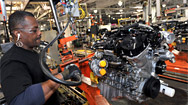Assurance
For this Sustainability Report and our previous six reports, Ceres convened Stakeholder Committees to advise us. Ceres leads a national coalition of investors, environmental organizations and other public interest groups working with companies to address sustainability challenges. Ford agreed to work with a stakeholder team that was selected for us by Ceres. The Ceres Stakeholder Committee that was convened is an independent group of individuals drawn primarily from the Ceres coalition and representing a range of constituencies that have expertise in environmental, social and governance issues.
The Committee reviewed past reports, the outline for the 2012/13 Sustainability Report and a draft of the updated materiality analysis, which is included in this report. The Committee met once by teleconference, and some members provided input to Ceres outside of the meeting.
The Committee provided a range of suggestions to improve Ford’s reporting and materiality analysis. Major points of feedback and Ford’s responses are shown below.1
| Reporting Recommendations | Response |
|---|---|
| Climate change and renewable energy: Climate change remains the most important sustainability issue for Ford. Ford has made progress addressing the climate impacts of its products and operations, but has the opportunity to “go further.” Specifically, the group looks to Ford to commit to aggressively improving the fuel economy of its fleet across the globe, not just in North America and Europe. To minimize the impact of its operations, Ford should set an absolute greenhouse gas reduction goal and commit to sourcing more renewable energy. | Ford’s climate goal is an absolute, global goal that takes into account both products and facilities and is based on contributing to climate stabilization, as described on the Climate Change section landing page and the section on Ford’s Science-Based CO2 Targets. We have implemented renewable energy projects as opportunities have presented themselves, but we do not have a specific target for renewable energy generation or sourcing at this point. |
| Water: Stakeholders are pleased that water is one of Ford’s top priority areas, and appreciate Ford’s recognition of the human right to water. The group also supports Ford’s approach to move “beyond the fence line,” and encourages the Company to communicate how it integrates water into everyday business decisions. | In this year’s Sustainability Report, we have continued to expand the coverage of our evolving water strategy and the steps we are taking to analyze risks and use water efficiently everywhere we operate. The report also continues to highlight the investments we make in water stewardship projects in the communities where we have facilities. |
| Managing the impact of a growing business: Ford’s turnaround in the last five years is impressive, as are its global growth plans for the near future in China and India. The group would like Ford to communicate how it is ensuring that it will manage environmental and social risks associated with increasing operations in Asia, as well as continue to communicate how it is addressing the implications of aggregate growth around the globe (not just Ford’s growth) and the pressures it will put on the environment. | Our climate and water strategies take into account the overall growth in the market for cars and light trucks. Our work in mobility explores the constraints on growth in private ownership of automobiles and new models of meeting human needs for mobility. This year’s report includes an expanded discussion of our operations in China. |
| Public policy: Public policy can help address the enormous environmental and social challenges facing Ford and society at large. The group looks to Ford to advocate for policies that help address climate, energy and human rights issues; to provide greater disclosure of participation in industry associations; and to use its influence within trade associations to ensure they are not opposing important sustainability legislation. | Ford is very engaged in public policy discussions in a variety of venues and forums (see the Public Policy section). Our culture is to work within channels to achieve ends that are consistent with our public values and with our sustainability priorities, including climate change, water, human rights and healthy communities. |
| Communicating to investors: Capital markets can be a powerful force for sustainable development, but that depends on the allocation of capital to companies and projects that minimize environmental impact and seize opportunities to create broad stakeholder value. Ford should continue to look for opportunities to demonstrate to the investor community how its sustainability work is creating that value – for instance by including key environmental, social and governance metrics in its 10-K and other investor communications. | This Sustainability Report is our main vehicle for communicating the business value of our sustainability strategy and performance. We have included a section on financial performance in our Sustainability Report for the past eight years and outline the business benefits of addressing each of our material issues. The 2012 Ford Annual Report, online for the first time, includes a section on “Better World”, which highlights several of our key areas of sustainability focus. For the launch of this report, our chief financial officer and our global director, Sustainability and Vehicle Environmental Matters, conducted a briefing on highlights of the report for investors and other interested stakeholders. |
| Goals, targets and performance data: The group recognizes Ford for setting water and waste goals over the last year, and encourages the Company to consider setting more aggressive goals in areas where goals currently exist, and new goals where there are currently none. Goals should be time-bound, covering the near, medium and long terms, be specific and measurable. In particular, the group would like to see more goals demonstrating Ford’s commitment to diversity and developing a sustainable supply chain. Finally, Ford should increase disclosure of year-on-year trend data in these areas. | We have a range of goals related to supply chain sustainability. For example, we encourage all of our key production suppliers to introduce codes of conduct aligned with international standards and Ford’s Code of Human Rights, Basic Working Conditions and Corporate Responsibility; to develop robust management and compliance systems to support their codes; and to extend these expectations to their own suppliers. We also have goals to increase supplier training and assessments, and to understand our suppliers’ carbon footprints. We are working with the Automotive Industry Action Group to be able to provide year-over-year progress reporting of supplier training data in a consistent format. In addition, each year we set specific numeric targets for spending with minority- and women-owned suppliers. |
| Materiality Analysis Recommendations | Response |
|---|---|
| Materiality context: Stakeholders recommended that Ford provide additional detail on the issues in the upper-right section of the materiality matrix to more clearly define its top-priority issues. Also, a brief description of how “Impact on Ford” (one of the axes on the materiality matrix) is defined would be useful. | We encourage report users to click through the interactive materiality matrix online for more detail on how the upper-right issues are defined, which stakeholders are most concerned with them and how each issue has changed in importance. We have added language to better define “impact on Ford.” That language can be found in the overview of analysis section. |
| Energy resources and other large-scale resource challenges: Consider including a new category for “energy resources” in the materiality matrix. The questions of whether there is enough fuel for future sales growth, what sort of fuel that might be, and what its wider system impacts are, are major strategic issues facing Ford and all automotive manufacturers. While Ford is already taking action in this space, it should be represented in the materiality matrix. | We agree that these are critical strategic trends. Ford is monitoring energy and resources challenges and incorporating insights from that monitoring into our overall sustainability strategy, our water strategy and our low-carbon strategy (represented on the materiality matrix). The low-carbon strategy, in turn, drives our Sustainable Technologies and Alternative Fuels Plan, which is discussed in detail in this report. |
| Workplace issues: Employee survey results indicate employee satisfaction was 69 percent (up from 62 percent in 2009) – a good trend, but still leaving room for improvement. In spite of high unemployment, there is fierce competition to attract and retain the best and the brightest engineering talent. As such, and given Ford’s plans to hire more engineers in the U.S., workplace issues inclusive of health and safety, morale and teamwork should be a higher priority for the Company. | The issues of employee morale and workplace health and safety are already ranked among those of highest priority for Ford. In this report, we have expanded coverage of employee issues, including more detailed discussion of employee surveys and our Company’s first survey of hourly employees on health and safety, among other topics. We also provide more detail on leadership development and on programs we’re implementing to develop the workforce of the future. |
| Public policy: In the U.S., there are numerous issues being publicly debated that will impact Ford’s business and ability to meet its sustainability commitments (e.g., for renewable energy). Therefore, stakeholders feel that engagement on these issues should be considered a high priority. | The public policy issue of greenhouse gas/fuel economy regulation has been a top priority of both Ford and stakeholders for several years. Our update to the materiality analysis initially suggested that the issue had declined in importance to stakeholders but this input from the Committee confirmed that it should remain in the upper-right portion of the materiality matrix. |
| Supply chain sustainability: Supply chain sustainability (including resiliency) is becoming a more prominent topic of conversation in boardrooms and executive offices and with investors. The issue is of higher concern than is reflected in the matrix and will likely increase in importance in the years to come. | In this year’s analysis, we added the issue of “identifying and managing sustainability-related supply chain risks” to make more explicit an issue that had been implicit in our approach to human rights, environmental performance and conflict minerals. This issue could become even more important in the future, and we will monitor it and consider whether it should be moved to the upper-right section of the matrix. |
| Ethical business practices: Ford is expanding operations in regions of the world known for significant corruption. Stakeholders recognize Ford has a strong anti-bribery policy, good tools and a robust compliance process in place to address potential corruption, but seek more specific disclosure on what the Company is doing to ensure it is managing the challenges associated with expansion in China and India. | We agree that this issue is increasing in importance for global companies and will consider whether it should move up in importance to stakeholders in future analyses. We have expanded the discussion of anti-corruption and anti-bribery in this year’s report in the Governance section. |
| “Shareholders concerns”: The necessity of the category “shareholders concerns/resolutions” is debatable, as each shareholder resolution is likely captured by the issue to which it is related. | We encourage Report users to click through in the matrix for a definition of which stakeholder concerns are represented by the “stakeholder concerns” issue. |
Other Committee recommendations will be considered for future reporting.
Data Assurance
Some of the data in our reports have been subject to various forms of internal and third-party verification, as follows.
- Financial data were audited for disclosure in the Ford Annual Report on Form 10-K.
- More than two-thirds of Ford’s global facility greenhouse gas (GHG) emissions are third-party verified. In 2011, Ford became a Climate-Registered member of The Climate Registry. All of Ford’s North American GHG emissions are now also verified under The Climate Registry. The Climate Registry is a nonprofit collaboration among North American states, provinces, territories and Native Sovereign Nations that sets consistent and transparent standards to calculate, verify and publicly report GHG emissions into a single registry. In addition, all emissions data covered by the EU Emission Trading Scheme (EU-ETS) and voluntary UK Climate Change Agreements are third-party verified. All EU-ETS verification statements are provided to Ford by facility from the BSI for UK facilities, Lloyds for Spain and the Flemish Verification Office for Belgium. North American facilities are verified against the Climate Registry’s General Reporting Protocol. European facilities are verified against the EU-ETS rules and guidelines.
- Ford voluntarily reports facility CO2 emissions to national emissions registries or other authorities in Argentina, Australia, Brazil, Canada, China, the Philippines, Taiwan and the U.S.
- Various environmental data are reported to regulatory authorities.
- Ford’s facility environmental data are managed using our Global Emissions Manager database, which provides a globally consistent approach to measurement and monitoring.
The kind of assurance used for each data set is noted in the data charts.
- This synopsis draws from a summary of the stakeholder engagement process prepared by Ceres; however, it does not cover every point raised and was not reviewed by the participating stakeholders.










